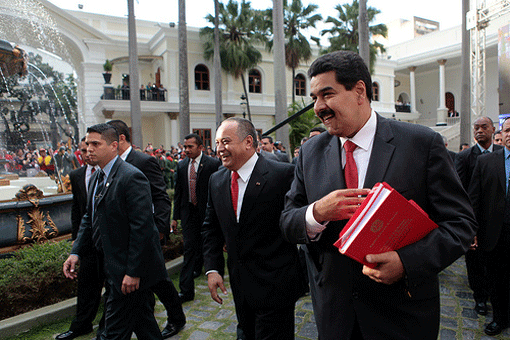Hugo Chávez engineered an electoral budget boom on steroids to win the 2012 presidential election. His economic strategy resulted in a significant appreciation of the real exchange rate, an increase in imports to a historical peak, and a considerable increase in public wages. Facing a strong contender in Henrique Capriles—and the limits to his campaign effort imposed by his illness—he resorted to the proven strategy of pouring money into the pockets of his poorest constituents. This is the same strategy used very effectively in the 2004 and 2006 electoral challenges but one that will eventually have dramatic economic consequences.
Beginning in the second half of 2011 the electoral boom cycle began with a dramatic increase in money supply and public expenditures. Six months later the results were visible: Chávez’ popularity increased by more than 10 percentage points in all opinion polls. Many political observers mistakenly attributed this surge in support to sympathy from the announcement of his cancer or to the launch of Mision Vivienda, an ambitious public housing program. But, in reality, the main source of the president’s popularity was the increase in the consumption capacity of the poor—a feat that is only possible due to oil-fueled public expenditures and the short-term macroeconomic boost generated by the manipulation of monetary, fiscal, exchange rate, and wage policies.
But, with the president in Cuba for the last month and a crisis of leadership at home, how will the government face its eventual economic reckoning?
The economic challenges are staggering. In 2012, the government spent about 51 percent of GDP—the highest level in the region—by taking advantage of high oil prices and its unprecedented control over government revenues, the financial system and the Central Bank. In the year leading up to the election, total government spending increased by more than 40 percent in real terms, similar to the increase in 2006 during the previous presidential election. This spending binge led to the highest public sector deficit in history (about 17 percent of GDP)—an astonishing deficit in the middle of an oil price boom.
The increase in expenditures allowed the government to increase public wages by more than 30 percent in real terms, create a public housing investment boom and move the country strongly out of recession, despite the relatively poor performance of the oil industry and the private sector. The 20 percent inflation in 2012 was still high but it declined significantly from 2011, despite the spectacular increase in the money supply. Inflation control was largely the result of importing a record $50 billion in goods and services at a highly over-appreciated exchange rate, which were then sold at subsidized prices.
The macroeconomic imbalances generated by the electoral cycle are so significant that most economic analysts believe a major adjustment is inevitable during 2013. The predictable consequence would be a decline in real consumption, which generally translates into a loss of support for the government. Already, the effects of the reckless policies of 2011–2012 are beginning to show. In December, inflation spiked to a monthly rate of 3.5 percent, the highest level since 2008. Similarly, during the same month the Central Bank found the level of scarcity of goods to be the highest in more than four years.
After Chávez’ victory, many analysts had reasonably predicted a significant devaluation and the cabinet appeared to be studying options for doing so. But with the president in Cuba since mid-December, any policy adjustment is currently stalled.
Uncertainty now pervades economic as well as political discourse in Venezuela. Will the government go forward with an adjustment, as was previously expected, knowing that new elections are likely in 2013? Can they afford not to do it? How long can it be postponed?
Some adjustment seems inevitable and the post-election pace of expenditures and imports has already slowed. This is very problematic for Nicolás Maduro, the vice-president and potential candidate if Chávez were no longer able to govern. He knows well that chavismo has won using the advantages of incumbency and the manipulation of the electoral cycle. So if the time comes, Maduro can be expected to insist on quick elections, while chavismo is still a majority and before any major adjustment has to happen.
However, elections with Chávez deathly ill seem implausible. So Maduro and the leaders of chavismo have to wait and see if and when Chávez dies or if he can come back and help them campaign. But what if the president is still ailing a few months from now? Can they manage to keep postponing major economic decisions?
In all likelihood they have some room to maneuver. For example, one of the main reasons why a devaluation is expected is that it has positive impact on public-sector finances and allows the government to transform the same oil dollars into more domestic currency (bolivars), thereby reducing the deficit. However, the government is already doing something similar since the Central Bank is financing PDVSA, the national oil company, in bolivars. This is a very unorthodox and irresponsible policy, but one which they can continue to use for a while to avoid an open devaluation.
Still, the main restriction the government faces is external. To sustain current consumption levels they have to maintain high import levels and the question is if they have, or can find, enough dollars to do so. With the current high oil prices and crude production levels, which have stabilized or slightly increased, the Venezuelan external balance should be comfortable. However, given the dramatic over-valuation of the exchange rate and the resulting massive level of imports, if the government wants to keep the current consumption boom it will probably have to run down all the remaining foreign exchange funds. This would leave the country in an extremely vulnerable position by the end of the year.
In sum, the government may be able to maintain the bonanza for at least the first semester of the year and maybe longer, but the costs of doing so will be increasingly high, unless the price of oil spikes. The optimal strategy for chavismo seems to be to hold elections sooner rather than later, while the money keeps flowing.
If they manage to hold quick elections with Maduro as the “incumbent” president and by taking advantage of the “sympathy” effect, they will be hard to beat. Still, the contender, Henrique Capriles, cannot be underestimated. If Capriles plays his cards right, he still stands a good chance. But whoever is in charge cannot indefinitely delay the country’s eventual economic reckoning.








